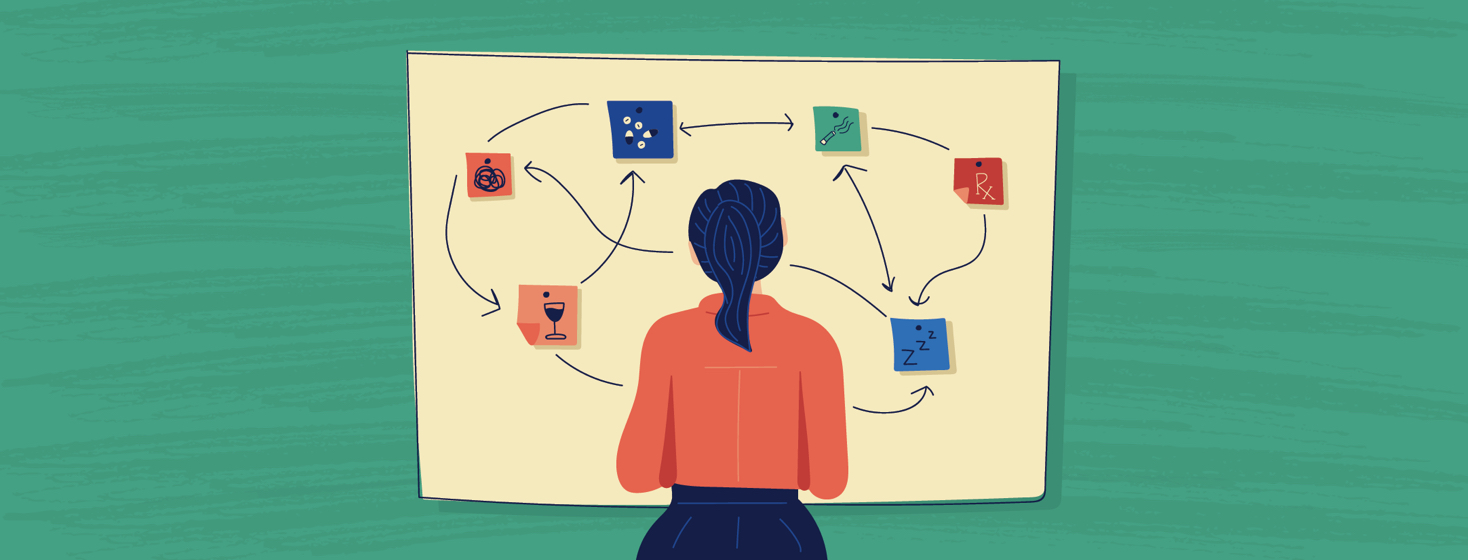Reviewing RLS Triggers to See What Lifestyle Changes I Can Make
I went about my restless legs syndrome (RLS) treatment, first and foremost, by taking supplements. Then by taking the medication my neurologist gave me. My RLS was really severe at that point and nothing ever really tamed it.
Now, I am wondering if I went about it backward. Instead of looking for things to suppress it, maybe I should have been looking at what triggers it in the first place and eliminating those things.
So what is triggering my RLS anyway?
Restless legs syndrome triggers
It turns out there are a whole lot of potential RLS triggers:
- Stress and anxiety
- Smoking
- Alcohol
- More vigorous exercise – this is definitely the case for me if done in the evening
- Inactivity – so also, no exercise. But also many of us do experience it when we are forced to be still for very long periods of time
- Medications: anti-nausea medications, antihistamines, antidepressants, antipsychotics, decongestants
- Caffeine
- Lack of sleep
- Pregnancy
- Refined sugars
- Temperature
My main RLS triggers
Smoking
This is one I am currently working on due to other health issues of mine. I am currently reducing this substantially as I get ready to just quit.
Inactivity
I actually do try to exercise. However, I have a vestibular disorder, and vertigo makes it very difficult to exercise with any real regularity. But I try. It is a slow process, and choosing very specific things I can do that do not trigger vertigo severely.
Caffeine
Due to my sleep issues, caffeine is an issue of mine. Definitely a problem.
Lack of sleep
With RLS and my recently diagnosed sleep apnea, among other sleep issues, I am pretty sleep-deprived. My sleep is irregular and erratic. I am exhausted during the day. Not good. And, yes, I have noticed the impact on my RLS as it has gotten worse over time. Until I looked this up, I wasn’t aware sleep deprivation was a trigger, but since it is, that makes a whole lot of sense
Medications
Some medications I knew about, and I have gotten rid of. I didn’t know about anti-nausea medications, which I sort of need due to the vertigo issue. I also didn’t know about anti-histamines and decongestants, which I use due to allergies and asthma, which make the sleep apnea worse if I do not treat them effectively. So sort of need these, for now.
My lifestyle change action plan
When I look at this list for an immediate action plan, I think stopping smoking is at the top of the list. The main reason I am doing it is to improve or get rid of my mild sleep apnea. Hopefully, this will improve my sleep quality and make me sleep far less erratic and disrupted.
First, quality sleep
If I can sleep through the night again and actually get some quality sleep, that might improve my RLS right there. Secondly, it will improve my asthma and allergies, which will reduce my need for the medications that may be worsening my RLS. I will continue to try to exercise to the best of my current limitations. Once I quit smoking and establish that new routine, then I can tackle the caffeine reduction.
Stress reduction and temperature control
I don’t drink alcohol at all. Obviously, that would not be a good idea with vertigo, so I got rid of that one years ago. I do regular meditation and relaxation breathing, so I think that helps with stress reduction. I do think temperature is actually something that affects RLS significantly. Like heat and humidity in the summer. We just got an air conditioner, so this summer – hopefully not! I also pay attention to good sleep hygiene.
Reviewing triggers is a good place to start
I definitely have some triggers I wasn’t aware of that make RLS worse. Mostly, I was aware of the things to do that may help make it better. But when I look at this list, there are things I can do lifestyle-wise that may impact my RLS and overall quality of sleep.
Since I have more than one sleep issue, it will impact more than one problem. I think reviewing triggers is a good place to start in looking at what might impact our RLS.
Potentially, we could find things that might improve its intensity or frequency. Have you thought about a lifestyle action plan for your RLS treatment?

Join the conversation